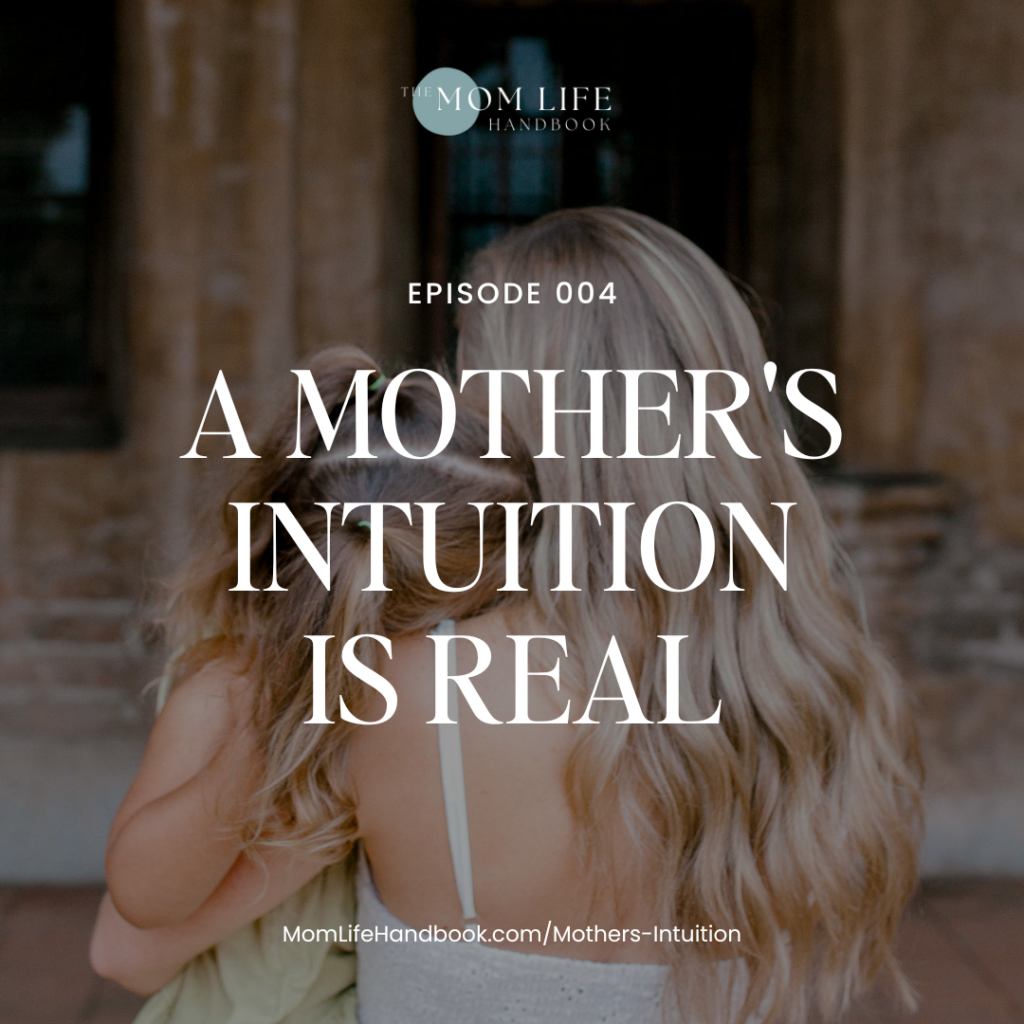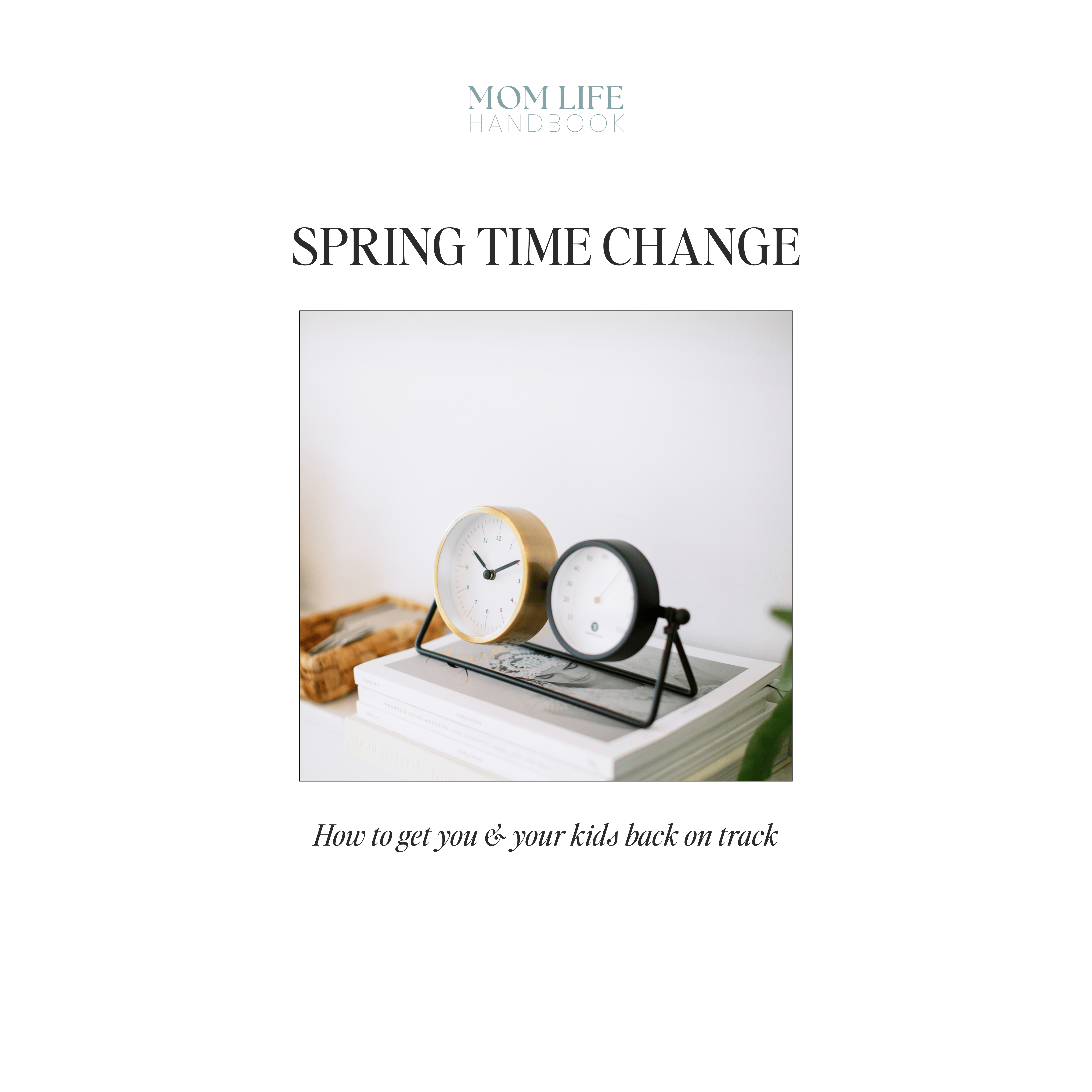A Mother’s Intuition is the Key to Confident Parenting

| A 6-Min. Read
Episode Highlights
Embracing your intuition as a mother can change the way you approach parenting, giving you a steady sense of confidence to handle decisions big and small. In this episode, we explore what makes a mother’s intuition so powerful, why it matters, and how trusting it can make navigating everyday parenting challenges a little easier.
Here’s What You’ll Gain:
✅ You’ll learn why intuition is one of your greatest parenting tools, helping you feel more assured when choices come up, even in the face of uncertainty.
✅ You’ll discover the difference between intuition and fear, making it easier to recognize when your inner guidance is grounded and reliable.
✅ You’ll feel empowered to blend advice from experts with your instincts, creating an approach to parenting that works uniquely for you and your family.
✅ You’ll find ways to tune into your intuition daily, helping you make decisions that feel aligned and sustainable.
What Is a Mother’s Intuition?
If you’ve ever had that undeniable feeling that you just know what’s best for your child—even when others might have a different opinion—you’ve felt the power of mother’s intuition. This isn’t based on logic or long lists of pros and cons; it’s an understanding that comes from your lived experiences, memories, and values, all coming together in moments that matter. With so much advice coming at us as moms, it can be easy to start doubting our own sense of what feels right, even though we often know ourselves and our families best.
Key Insight: Your intuition is a personalized navigation system for motherhood. Trusting it can lead to a more confident and authentic experience.
Why Trusting Your Intuition Matters
Choosing to rely on your intuition helps you find confidence, even when you’re juggling endless opinions and advice from well-meaning friends, family, and experts. Trusting your intuition can be like a calming reminder that you’re already capable of making good decisions. Instead of constantly looking outward, you can turn inward and know that your choices are coming from a place that understands your family’s unique needs. This reassurance helps to keep mom guilt at bay and reinforces that you’re doing what’s best for your little ones.
Intuition vs. Fear: Finding a Clear Difference
Sometimes, especially in high-stakes moments, you might feel your gut instinct laced with a bit of fear or anxiety. It’s natural—parenting is full of moments that feel big and emotional. But there’s a difference between that calm, steady voice of intuition and the anxious feeling that can accompany worry or stress.
Fear often brings a sense of urgency or even panic, while intuition is more of a quiet, settled feeling. It doesn’t rush you or make you second-guess. Recognizing this difference can be freeing, helping you feel more grounded in your decisions.
Tip: If something feels emotionally charged or overly urgent, try taking a breath and seeing if you can hear your intuition underneath that noise.
Practical Ways to Tune Into Your Intuition Daily
Building a habit of listening to your intuition can take practice, especially when we’re surrounded by so many other opinions. Here are a few small steps that can help:
Pause Before Deciding
When you’re about to make a decision, especially one that’s been weighing on you, take a moment to pause. This gives you a chance to tune in and notice how you really feel about the choice in front of you.
Notice Patterns
Reflect on times when your intuition guided you well. Maybe it was knowing your child needed an extra check-in at school, or sensing that a friend’s advice didn’t quite fit your child’s needs. Recognizing these moments helps build trust in yourself.
Limit Outside Advice
While it’s helpful to gather insights, sometimes we can get lost in too much input. Trust that you already have a solid foundation, especially when it comes to decisions that feel very personal.
Allow Space to Adjust
Intuition doesn’t lock you into one answer forever. As life changes, so do your needs and insights. Giving yourself permission to reassess as you go helps your intuition adapt alongside you.
Balancing Expert Advice with Your Own Intuition
It’s reassuring to know that trusting your intuition doesn’t mean rejecting all outside advice. In fact, it’s often a mix of both that makes our decisions feel balanced and well-rounded. Trusting yourself and choosing what fits your family best is key. Knowing you can take expert guidance and blend it with your own insights allows you to make choices with less self-doubt and more ease.
Reminder: Intuition and expert advice can coexist, helping you make balanced parenting decisions that feel right for your family.
Stepping Away from the “Perfect Mom” Pressure
Social media and the idealized images we see every day make it so easy to feel like we’re supposed to be a “perfect” mom. But real life doesn’t look like a curated Instagram feed, and no one’s parenting journey is seamless. Leaning into your intuition helps you feel grounded in what’s right for your family, even if it doesn’t align with what someone else is doing. Trusting your instincts instead of constantly comparing allows you to release some of that pressure to be “perfect” and focus on what’s meaningful to you.
Embracing Your Unique Path as a Mom
Parenting looks different for everyone, and what works in one family might not work in another. By trusting your intuition, you give yourself permission to make decisions that reflect your own values and goals, creating a parenting approach that’s truly yours. This shift can help you move from questioning yourself to feeling more confident that you’re making choices that fit your unique family dynamic.
A Few Final Thoughts—
Motherhood is full of decisions, from the small everyday choices to those moments that feel big and defining. Relying on your intuition can be one of the most supportive tools you have, allowing you to feel confident and at peace with your decisions. As you lean into this inner wisdom, know that you’re choosing a path that aligns with your values and your family’s needs.
⏰ Don’t have time to tune in?
📑 Read the Show Notes Here
Embracing Your Intuition in Mom Life
Today we’re tackling something that can make a huge difference in your daily life—embracing your intuition. Together, we’ll explore the importance of a mother’s intuition and how you can lean into it for a more authentic and fulfilling mom life.
If you’ve ever felt overwhelmed by parenting advice or doubted your own decisions, this episode is for you. Join me as we address the perfect mom myth and discover the benefits of trusting your gut. If that’s what you need more of in your life today, you’re in the right place. Let’s simplify things together.
Introduction to the Mom Life Handbook Podcast
Hey there. Welcome to today’s episode of the Mom Life Handbook podcast. We’re diving deep into the power of a mother’s intuition.
I’m sure you’re familiar with that feeling—it’s that little voice inside of you that somehow just knows what’s best for your little one, even when everything else feels uncertain or other people are telling you otherwise. In this episode, we’re going to talk about how to lean into your intuition, and trust me, it’s going to be a game changer for your mom life.
What Exactly is Intuition?
So, what exactly is intuition? There’s an article I recently read in Forbes that I’ll link in the show notes. They described intuition as the ability to know something without any analytic reasoning. It’s where your body bridges the gap between your conscious and unconscious mind.
You see, our gut is lined with neurotransmitters that receive, store, and communicate information back to the brain. In fact, the gut is often called the “second brain” because of its role in assessing all of our memories, past learnings, personal needs, experiences, and preferences.
And what I think is so cool is that mothers, in particular, have a unique intuition. It’s something that starts in the womb and is primed by the surge of hormones that we experience during pregnancy and childbirth.
The Carryover Effect: This intuition carries over into our whole experience as we raise our little ones and make decisions based on what we believe and know to be in their best interest.
Trusting Your Intuition Amid Doubts and Decisions
Now, I know that we’ve all faced these moments where we’ve doubted ourselves or struggled with making a decision—whether it’s choosing a preschool, deciding on medical treatments, or figuring out the best way to handle a challenging parenting moment that’s going to help and support your little one.
Key Point: When we learn to trust our intuition, we become more confident, more decisive, and better equipped to navigate the ups and downs of motherhood.
Where things can get complicated—and I feel it’s worth noting—is that there is a difference between our gut instinct and making decisions from a place of fear or anxiety. They are two distinctly different things.
Understanding the Difference: Intuition vs. Fear
Since I’m not the expert in the science behind all of this, I thought I’d share this quote from Dr. Judith Orloff. She explains that intuition comes through as neutral, non-emotionally charged, and almost impersonal. It’s just information that’s been stored in your body.
Fear, on the other hand, has a high emotional charge and can be related to anxiety issues, clouding our thoughts and judgment.
In today’s episode, we’re looking less at those emotionally charged moments and instead exploring how to realize and trust your own intuitive powers when cognition is high and emotion is low.
Building Confidence in Your Intuition
We’re going to build confidence in your intuition, see how it can help you overcome mom guilt, challenge the perfect mom myth, and share practical ways to lean into your intuition.
If you’re already feeling confident in your intuition, that’s something I’m really proud of you for. Remember, there’s always room for growth. This is something I’ve been learning about for the past few years, and I’m still working to develop it. Quite honestly, I hope I never stop. By developing your intuition further, you’ll find that it becomes an even more reliable guide for your journey through motherhood.
So, let’s dive in and discover how to harness the incredible power of a mother’s intuition, because you’ve got this, and I’m here to support you every step of the way.
Contextualizing Intuition in Your Own Experiences
The first thing I want to do is help you contextualize intuition in your own experiences. I realize that some of us don’t necessarily feel particularly intuitive. I think that sharing a real-life example from my own motherhood journey might help you to kind of see, “Oh, actually, I have had these moments where my intuition has come through for me.”
I think our society has really pushed us to a point where there’s so much information from external sources that we’ve become detached from trusting our own intuition—or even believing that it’s a real thing in the first place. While I definitely wanted you to hear the science behind intuition, I want to offset that with my own personal experiences as well.
A Personal Example: Trusting My Gut
So let me share one example from a few years ago, and I think you might relate. When we first relocated from Chicago to Colorado, I wanted to have one of my children evaluated for special education support.
Now, yes, I am a master teacher, and my specialty is intervention and support for students who are striving to keep up with their peers. But I also am not my child’s teacher and was relying on the school system to validate my concern and identify whether special education was an appropriate form of support.
My child had a significant history of early intervention from the time they were just a year old, and they’d also been receiving additional support at school. We even delayed starting kindergarten by a year.
Advocating for My Child Based on Intuition
So, I put in those requests before the school year had even started. Then, my child comes home, and I get an email that afternoon telling me they had observed my child at school. First day of school, a half-day—actually only a few hours, not even a full half-day—and they informed me that my request for an evaluation had been declined, stating that my child was on par with their peers.
Trusting My Gut: This didn’t sit well with me. I couldn’t understand how spending just a few hours with my child on the first day of school gave them a clear understanding of where my child stood academically or developmentally. So, I stuck to my gut. I persisted in sharing other evidence and experiences, which ultimately led to an evaluation and subsequent identification of needs that warranted additional learning support.
Although well-intentioned, these experts—trained and certified to identify students needing special education—still didn’t understand my child’s unique needs in the way I did as their parent.
Filtering Through Expert Advice Using Intuition
I want you to consider how leaning into your intuition helps you filter through parenting and expert advice. It allows you to sift through the noise and information, ultimately identifying what works best for you and your family. This can really help reduce your reliance on others.
I’m not saying that external advice isn’t beneficial—I’m here giving you external advice and support—but it’s important to recognize that you can’t solely rely on that insight from other people.
Embracing Intuition as a Practical Parenting Tool
From hearing this experience, you might think, “Okay, I can relate to this. I’ve had situations where I feel like what I’m being told doesn’t quite match up with what I know my child needs.”
I want you to take that first step in recognizing that was intuition at play. Trust that your intuition is there, even if you don’t recognize it on a daily basis yet. Staying open to the possibility that you can trust your gut is the first step in learning to tap into it.
The Benefits of Trusting Your Intuition
I know you might wonder what it even looks like to tap into your intuition. I want to spend a bit of time discussing how trusting your intuition really benefits you and your family. Once you’re clear on why intuition matters, it becomes easier to trust it, even in ways that happen organically without a set system.
One thing I appreciate about leaning into my intuition is how it empowers me when faced with conflicting opinions.
Making Choices with Confidence and Less Doubt
We can probably all relate to the struggle of choosing the best preschool or elementary school placement for our child. The range of opinions on what’s best, and the pressure to choose “right,” is immense.
Instead of getting lost in confusion—Montessori vs. public preschool, private education vs. homeschooling—you can trust your intuition to choose what best suits your child’s needs.
Balancing Intuition with Expectations
Sometimes, despite following our intuition, expectations and outcomes can fall short. That doesn’t mean you made a bad choice; it just means you did your best with the information and circumstances you had. You can rely on your intuition to know when something’s off or when it’s time to pivot and make a change.
Remember, you don’t have a crystal ball. So don’t discredit your intuition—it just means it’s time to reassess and move forward.
Intuition and Expert Advice: Finding a Balance
I think this is a great time to explore the idea that intuition and expert advice can coexist. While trusting your gut is crucial, finding the right balance with expert guidance can help you make well-rounded parenting decisions that are best for your family, which, ultimately, only you know best.
I really want to highlight that when you’re able to strike this balance between relying on expert guidance and following your gut, you’ll start to find that you’re much more confident in the decisions you make.
This also means you can make decisions more quickly, without all the hemming and hawing. It’s especially helpful in ditching the guilt that we often feel when making difficult decisions.
How Intuition Helps with Mom Guilt
Mom guilt is one of our most common struggles. But the good news is that it doesn’t have to define you or your parenting journey. Trusting your intuition can help you make choices that feel right for your children and, in turn, can alleviate some of that guilt.
Sometimes, making the right choice for your child comes with the worry that they might be upset, disappointed, or frustrated with you. And, of course, we don’t want to cause those feelings in our children. But remember, your intuition can guide you toward a stronger, deeper “why” when it comes to making the best choices, which ultimately reduces feelings of guilt and doubt.
Reassurance for Moms: Trusting your intuition can be incredibly validating and reassuring—especially if you’re used to operating from a place of mom guilt and self-doubt.
Overcoming the “Perfect Mom” Myth
We can’t talk about mom guilt without addressing a major source of self-doubt: the perfect mom or “good mom” myth. It’s time to acknowledge that the idea of a perfect mom is unrealistic and places unnecessary pressure on our mental and emotional well-being. With social media everywhere, we’re constantly exposed to idealized versions of motherhood, and it can be difficult to keep perspective.
We all know that what we see is just the smallest, most curated glimpse of someone’s experience, but it’s still tough to filter through our social feeds with that in mind. This exposure can quickly lead to comparison and creeping self-doubt.
How Intuition Helps Us Stay Grounded Against Comparison
I want us to take time to explore how intuition helps us stay centered and grounded in moments when comparison sneaks in.
From my perspective as a creator, I try to be cautious about what I share on social media because I don’t want another mom to believe that I have it all figured out. When I first started creating content for Mom Life Handbook, my kids were young, and we spent a lot of time doing sensory play and process art. I shared those activities on my account.
But I quickly realized that many of my followers felt like they needed to offer those experiences in their homes, even though I never implied or expected that of anyone. Over time, I pulled back on sharing too much of our daily activities, as I didn’t want to project a message that moms needed to do what I was doing in order to feel like they were “enough.”
Intuition as Your Internal Value System
Something you may find helpful is to think of your intuition as an internal value system. They are closely aligned. Your intuition tunes into what matters most to you, helping you contextualize what you see other moms doing and determine if it’s even relevant to your own life.
When I find myself comparing what I do as a mom to another mom whom I admire, I try to tune into my intuition as a way to check in with myself. Your intuition aligns closely with your internal values, helping you filter through and contextualize whether what another mom is doing is relevant to your own experience.
Practical Example of Using Intuition to Avoid Comparison
Let me give you a quick example. You may have a friend who keeps a perfectly tidy home, while yours might feel like a disaster most days. When I think about the differences in those two approaches to maintaining a home, I realize it comes down to values.
For your friend, she might value less clutter because it’s overstimulating to her, or maybe she finds it fulfilling to care for the appearance of her home. But maybe you’re okay living with a bit of mess, recognizing that it’s an uphill battle that’s just not worth fighting. Perhaps you prioritize other things that mean less time for cleaning and tidying—maybe running a small business or being present while homeschooling your kids.
It doesn’t make either one of you a better mom. It just reflects the differences in your values.
Intuition as Your Own GPS in Motherhood
Think of your intuition as your personal GPS. It’s your unique navigation system for motherhood, helping you make choices that align with your values and goals. Sure, there are other routes you could take, but it’s overwhelming to focus on all of them.
Your goal is to reach a motherhood experience that feels good to you and aligns with your values. The rest truly doesn’t matter. So, I encourage you to explore how your intuition highlights your unique strengths and values. Choose your intuition over perfection, which is unattainable, and you’ll find it helps create a more authentic and fulfilling experience as a mom.
In time, you’ll appreciate what other moms do and feel confident that you’re showing up for your family in the way they need most.
Practical Tips for Strengthening Your Intuition
If you’re convinced at this point that intuition matters, but you’re unsure how to tap into it, or if you already feel intuitive but want to take it to the next level, I’ve got something for you. This week’s bonus episode for Mom Life Handbook Plus subscribers includes five simple ways to get started.
Even if you feel like you have strong intuition, this bonus episode offers fresh ideas to help you lean in more and increase your confidence.
Wrapping Up Today’s Episode
Alright, we’ve reached the end of today’s episode. We talked about the science behind intuition and how moms, in particular, have a unique intuition that helps guide us through the challenges of raising our little ones.
We also discussed the importance of balancing expert advice with your gut instinct, how it can help combat mom guilt, and the need to let go of the perfect mom myth.
Final Thoughts: Trusting Your Intuition
As you navigate your journey through mom life, remember that tapping into your intuition can help you feel more confident in your decisions, aligning with your values and goals. Your intuition is a personalized navigation system for motherhood. By trusting it, you’re creating a more authentic and fulfilling experience.
And remember, if you’re looking for practical strategies to start tapping into your intuition, I invite you to activate your free trial of Mom Life Handbook Plus on Apple Podcasts. With your free trial, you get access to bonus episodes and exclusive resources designed to help you dive deeper and receive support where you need it most.
So go ahead, click the “try free” button on Apple Podcasts, and let’s continue this journey together.
Thank you for joining me today. And as we wrap up this week’s episode, remember:
Mom life is complex, but it doesn’t have to be complicated. Here’s to leading with purpose and intention as you simplify mom life in the week ahead.
FAQ’s About Following Your Intuition
💬 How can I tell if it’s my intuition or just worry?
Worry often feels urgent and emotionally charged, while intuition is usually calm and steady. If a choice feels rushed or creates an “all-or-nothing” feeling, it’s likely worry. Instead, intuition feels more like a gentle nudge rather than an alarm. Practicing small, low-stakes decisions with your gut—like choosing a family activity or what’s for dinner—can help you strengthen this sense of calm and make it easier to identify when intuition is guiding you.
💬 Why do I struggle to trust my intuition as a mom?
Modern life is filled with information, and it’s easy to feel like you need to follow every bit of advice to get it “right.” Remind yourself that you already have a deep understanding of your child’s needs. A simple approach is to limit advice when you start to feel overloaded—choose one or two trusted sources, and let your intuition guide the rest. Building small routines that align with your values, like family check-ins or regular one-on-one time, can also help reinforce that you’re on the right track.
💬 How can I use my intuition to parent my child’s behavior?
Your intuition is a valuable tool for understanding what may be behind certain behaviors. If your child seems upset or off, tune into your sense of what might be causing stress or frustration. If you’re unsure, consider observing quietly or checking in with simple, open-ended questions like, “Is there something that’s been bothering you?” This approach respects your child’s autonomy and allows them to express what’s really going on. Remember, small actions like a comforting word or even a change in environment can make a big difference.
💬 How do I balance expert advice and my own intuition?
While expert advice can be a valuable resource, it’s essential to check in with what feels right for your family. If certain advice feels overwhelming or doesn’t align with your values, trust that it’s okay to adapt it or leave it. Consider using expert resources as a starting point, not a strict rulebook. For example, if meal prep recommendations feel too structured, opt for a simpler version that works for you, like prepping one or two items ahead of time rather than a whole week’s worth.
💬 Can intuition help with reducing mom guilt?
Absolutely! Trusting your intuition can help you make decisions that feel authentic to you, which often lessens second-guessing and guilt. When you know your choices are rooted in what’s best for your family, it’s easier to feel confident even if things don’t go as planned. Remind yourself that no one decision defines you as a mom. Small adjustments like letting go of perfection with meals or screen time can relieve pressure, helping you feel more in control and less weighed down by guilt.
Get the Weekly Newsletter
You Might Be Interested In—
- Top Busy Mom Life Hacks: Stress Relief + Time Management to Reclaim Your DayFeeling overwhelmed? Unlock the busy mom life hacks you need to reclaim your time, ditch the stress, and master your to-do list.
- Why Moms Need Sustainable Change Right NowDive into why sustainable change is the game-changer you’ve been waiting for to revamp your mom life—without the overwhelm or burnout.
- How to Stop Overwhelm With These 5 Power ZonesDiscover how to stop feeling overwhelmed by tapping into your Power Zones—because you have more control over your mom life than you think.
- Unpacking Avoidance: Growing Awareness of Your Stress Patterns in MotherhoodReady to confront the stress in motherhood head-on? Tune in to discover how awareness can shift your entire day from chaos to calm, all while feeling understood and supported.
- How To Get Out Of A Funk In 3 Quick StepsStuck in a mom funk and short on time? Tune in for real-talk strategies on how to get out of a funk quickly, even on those non-stop days.
© MOM LIFE HANDBOOK 2025 | Privacy, Terms + Conditions
Design by tonic | Photos by K WEINBERG & E Christopoulos
© MOM LIFE HANDBOOK 2025 | Design by tonic | photos by KRISTIN WEINBERG and Erin Christopoulos | Privacy, Terms + Conditions
Mom life is complex,
But it doesn't have to be complicated.
Get your weekly permission slip.
Join 1,000+ moms getting an honest, weekly guide to doing less (not more).











+ Show / Hide Comments
Share to: